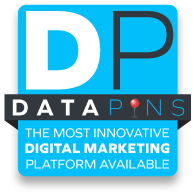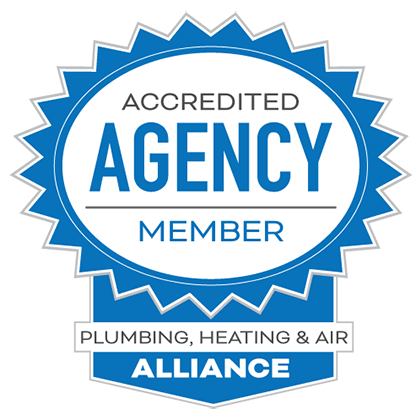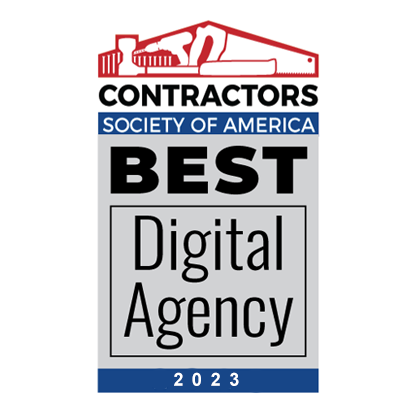Plumbing CRM software has become integral to running a successful business operation in 2025.
The research backs up this claim by revealing that 65% of small businesses adopt a CRM within their first five years.
At Plumbing Webmasters, we’ve worked with thousands of plumbers on digital marketing campaigns and helped them integrate CRM software into their business operations.
CRMs are excellent tools for plumbers because they streamline tasks such as scheduling, payments, invoices, estimates, and client communication.
With that being said, the number of notable CRMs has increased in recent years, leaving plumbers wondering which software best fits their business goals.
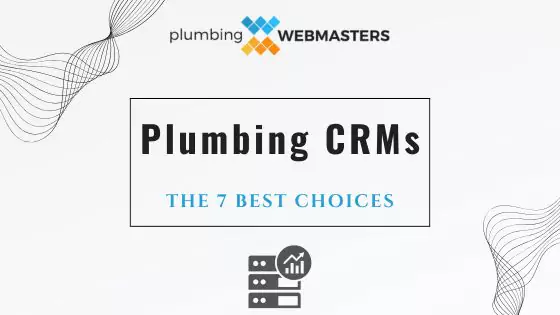
What is a Plumbing CRM?
Plumbing Customer Relationship Management (CRM) software seeks to streamline many of the processes that take up the time of your staff and service team.
CRM software suites usually offer digital tools for contacting clients, tracking plumbers in the field, managing invoices, and following up with customers.
Here are some of the processes that CRM software typically automates:
- Customer Management: A database to store client data, including contact and billing information and previous service history.
- Scheduling and Dispatching: An interactive schedule with the ability to assign jobs to technicians and dispatch them to the location.
- Payment Processing and Invoicing: A payment processor to take card payments from clients and an invoice system that generates and sends out invoices.
- QuickBooks Integration: The ability to sync billing information from QuickBooks.

Best CRMs for Plumbers in 2025
While there is no one-size-fits-all CRM selection for all plumbing companies, the industry highly regards several options.
Experiences with these CRMs sometimes vary depending on the size of the plumbing operation, its years in business, financial resources, and marketing efforts.
Ultimately, the best CRM for plumbers will be the one that streamlines your specific business most efficiently.
Below, we will outline the seven well-regarded plumbing CRMs:
1) Jobber
Jobber simplifies day-to-day operations for plumbing companies with an appealing front-end software presentation.
Its features, which include client management, invoices, payments, scheduling, job management, and client communication, are also more than enough for most local plumbers.
Jobber includes a mobile app that keeps contractors connected to their offices through live updates.
In addition, Jobber integrates with QuickBooks, the most widely used accounting software, allowing seamless data sharing between the two apps.
2) Housecall Pro
Housecall Pro is quite literally a household name for most plumbing companies as it allows them to manage their entire business operation through a smartphone and web portal.
The app seamlessly integrates with QuickBooks so companies can sync their billing and financial information with customer management data.
Notable features include API integrations, scheduling, invoicing, payment processing, dispatching, and a comprehensive client database.
The software also includes automated customer notifications, such as “on my way” text messages, schedule confirmations, and invoice reminders.
3) ServiceTitan
Large plumbing companies with 20+ trucks on the road might gravitate toward ServiceTitan, which is tailored toward more significant operations.
The ServiceTitan CRM is designed to help plumbing companies operate and scale their business to grow and become more profitable, sometimes across several locations.
ServiceTitan features include scheduling, dispatching, invoices, and call booking, all of which can be used at scale.
In addition to its benefits for more extensive plumbing operations, ServiceTitan also uses analytics to help plumbers make data-driven decisions about their company.
4) Service Fusion
Service Fusion is another field service management CRM software developed for plumbers and other home service providers.
The software includes standard features such as customer management, scheduling, dispatching, invoices, and payment processing.
Service Fusion stands out with its drag-and-drop scheduling interface and real-time job tracking for efficiency optimization.
In addition to integrating with QuickBooks, Service Fusion offers an in-app GPS fleet tracking component so plumbing companies can efficiently dispatch their technicians.
5) FieldEdge
FieldEdge is a cloud-based CRM and field management software for plumbers and other service providers.
Like other apps on this list, it provides features for customer management, scheduling, dispatching, invoices, and QuickBooks integration.
The mobile app provides access to client history, allowing technicians to have more personalized interactions with their customers.
With FieldEdge CRM, plumbing companies can improve profitability and productivity.
6) FieldPulse
FieldPulse is another CRM and service management software for plumbing companies and other trades.
The app provides scheduling, dispatching, customer management, estimates, and invoices.
The mobile app allows plumbing business operators to manage technicians in the field and efficiently communicate tasks and updates.
Like other CRMs for plumbers, FieldPulse includes a QuickBooks integration so companies can merge their billing info with client data.
7) WorkIz
WorkIz is a field management CRM for plumbing companies (and other industries) that helps optimize operational efficiency through features such as scheduling, dispatching, invoices, and payment processing.
The app’s user-friendly front end makes navigating its features straightforward for even the most old-school plumbers.
WorkIz’s mobile app includes job details, customer communication, and payment processing for use in the field on various plumbing jobs.
Like its competitor CRMs, WorkIz includes QuickBooks integration so plumbing professionals can keep their finances aligned with the rest of their operations.
Plumbing CRM Benefits
If you have gotten along just fine without using plumber CRM software, you may wonder why you should change things now.
CRM software will allow you to operate your business more efficiently and effectively.
Here are some of the essential advantages of using CRM software:
Reduce Human Error
All the moving parts of your operation are opportunities for human error.
A CRM will eliminate some of these moving parts.
For example, when one of your team members has to write down customer information with pen and paper, there’s no guarantee that your field team will understand the handwriting.
Misplaced documents can also be a significant setback for your operations.
CRM automates many of these processes and decreases the chances of miscommunication, lost documents, and missed connections.
Take More Calls
Your staff can only field one call at a time. What if they are talking to one customer while another calls to schedule an appointment?
That’s a missed opportunity and lost money. Most CRM software suites include a phone service that fields calls or directs them to available staff members.
Improve Employee Efficiency
When menial tasks like filing paperwork, sending out invoices, and sending important emails are automated with a CRM suite, your team has more time to focus on more critical tasks.
One of the most vital advantages of CRMs is delegating your man-hours in the most efficient way possible.
Minimize Confusion
Has your team even gotten mixed up in the field? For example, maybe two plumbers showed up at the same property when one was supposed to go elsewhere.
With CRM software, field mixups will happen less often.
All your team members will know where they are supposed to be, and software makes it easier and quicker to reroute team members from a job and send them somewhere else when needed.
Save Money
In the end, fewer wasted man-hours, fewer missed customer connections, and better resource allocation will make your business more profitable.
Operational efficiency is a quality of a growing business, leading to noticeable revenue increases.
Simplify Organization
The best CRM software suites for plumbing contractors will also include options for keeping track of tools, materials, and supplies you have in your inventory.
Some even have tools that keep track of your inventory and automatically order more supplies when needed.
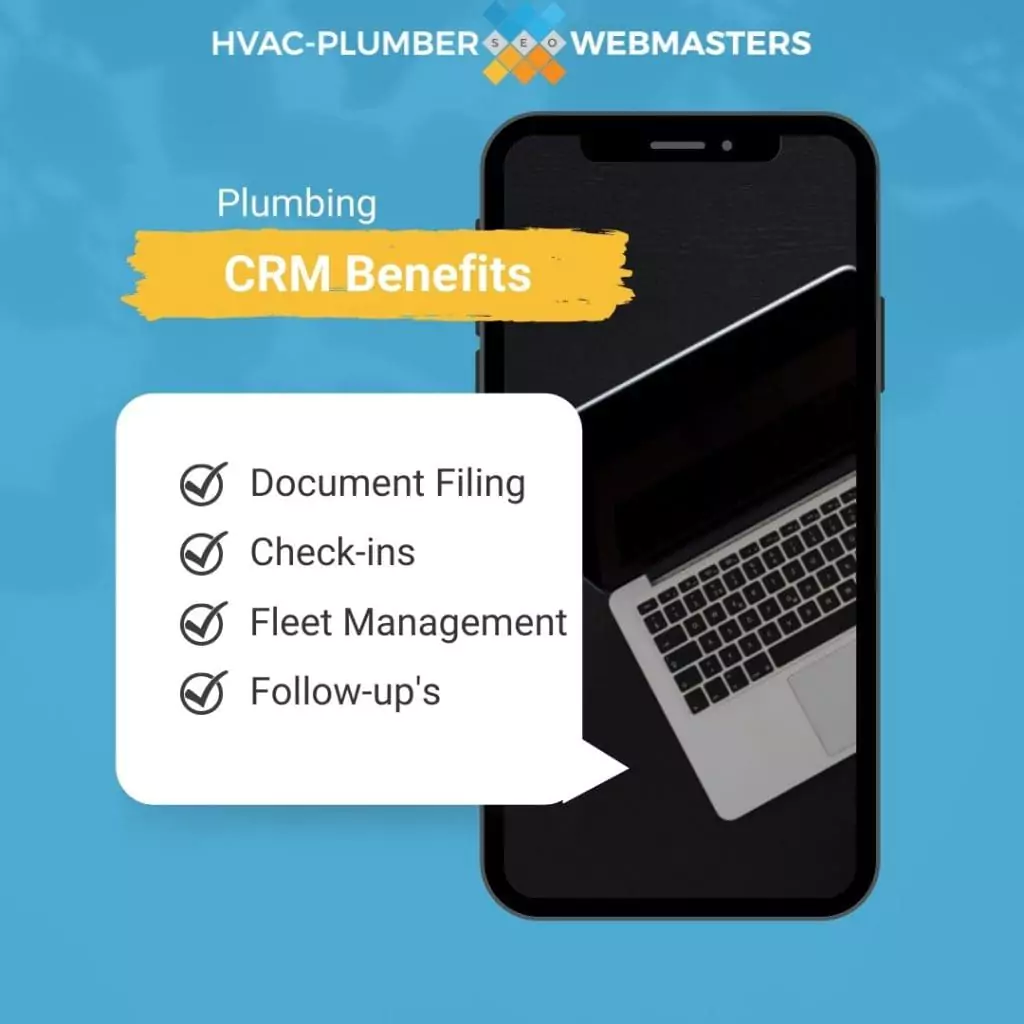
How To Choose The Best CRM for Your Plumbing Business
Picking a random CRM name out of a hat is not the best way to choose software for your plumbing business.
Identify your primary operational needs and prioritize which tasks must be streamlined.
Next, eliminate any CRM options that don’t provide the following features:
- Payroll Integration
- Realtime Technician Communication
- Client Communication
- Mobile App
- User-Friendly Interface
Most CRMs offer a demo or free trial so plumbing companies can try the software and narrow down the options much quicker.
The feedback we’ve heard from plumbers is that usability is paramount when choosing the best CRM for their business.
Furthermore, payroll integration is fundamental, which is why so many CRMs integrate with QuickBooks.
Price Considerations
Pricing is a factor for plumbing companies choosing customer relationship management software, and it should be.
Plumbing companies are at various stages of growth, from startup contractors to companies with 20+ trucks on the road.
Here are some pricing factors to consider:
Price Range
Entry-Level: Base CRM packages can fall between $100 and $500 per month and often provide the essential features of billing, invoicing, client data, and scheduling.
Customized: Most apps will upsell larger companies into a more comprehensive and customizable suite with advanced features.
Price Model
Per Month: Some CRMs charge monthly recurring prices for unlimited users.
Per User/Month: Many CRMs charge per user, per month, ranging from $25 to $200.
Tiered: Some CRMs use a tiered pricing model with more advanced features in each pricing tier.
It makes sense that plumbers at different stages of business growth will have different pricing ceilings as the startup contractor cannot compete financially with the multi-location franchise.
The sales representative of the specific software company often collaborates with you (the business owner) to calculate the cost of your CRM subscription.
Unnecessary Features
When choosing the best CRM for your plumbing business, consider which features are unnecessary or even harmful to your overall business trajectory.
For instance, some CRMs provide “marketing services” as part of their CRM, which can undermine a more comprehensive digital marketing campaign.
Just like you wouldn’t trust a digital marketing agency to build customer relationship management software, you should not trust CRMs to design elaborate marketing campaigns.
Some of the best CRMs offer marketing features, but most plumbers are better off hiring a reputable plumbing marketing agency and allowing them to handle marketing efforts.
Often, CRM marketing features go unused, and the focus shifts to the tasks that CRMs are meant for, such as scheduling, dispatching, and payment processing.
Software Integrations
Your plumbing business may already rely on specific software in its daily operations, which makes software integrations a serious consideration when choosing your ideal CRM.
We noted how most CRMs integrate with QuickBooks, the most commonly used financial management software for home services businesses like plumbers.
However, more than QuickBooks is required to help you choose the ideal CRM because your business likely relies on multiple other software.
Based on the plumbing companies we’ve worked with, other popular software integrations include Stripe, Square, Twilio, Slack, TradeGecko, Samsara, DropBox, and Google Drive.
Some CRMs also offer Zapier integrations, which are not directly built into their software but allow for third-party connection.
Moving Forward With Plumbing CRMs
Choosing the right plumber CRM is an essential decision for your business success.
While various options have emerged, it is critical to streamline tasks to choose the software that uniquely suits your company, its operations, and its growth stage.
Plumbing companies should actively avoid unnecessary CRM features better suited for other platforms, such as digital marketing agencies.
In addition, plumbers should prioritize their operational needs, such as scheduling, payment processing, invoicing, QuickBooks integration, and client data history.
Most CRMs offer a demo or free trial, which allows plumbing companies to test drive the software features and how they fit within the business operation.
Remember that a CRM is only valuable if your company consistently generates new plumbing leads through SEO and digital branded signaling.
To discuss your business plans, including CRM options for plumbers, call our agency at (877) 388-9884.

